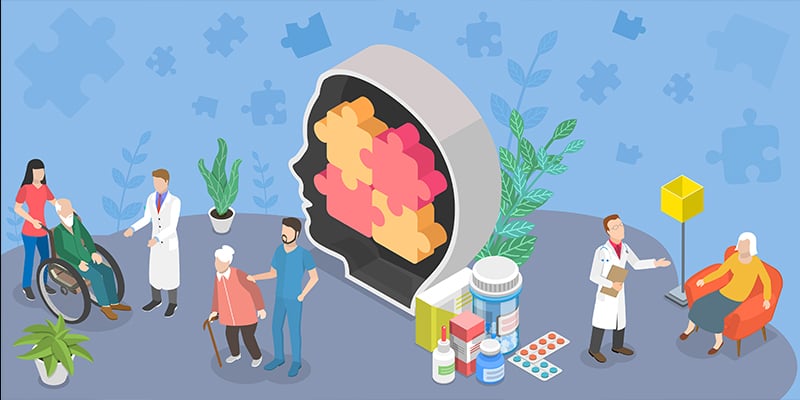
It’s bad enough that Alzheimer’s disease ravages a person’s memory. What’s even worse is that the disease is also associated with a number of psychological and behavioral symptoms that negatively impact quality of life. Research shows that an estimated 90% of people with dementia experience neuropsychiatric symptoms at some point in the progression of the disease. In some cases, emotional and behavioral changes may be some of the first warning signs of Alzheimer’s disease.
About 90% of people with dementia experience neuropsychiatric symptoms. In some cases, emotional and behavioral changes may be some of the first warning signs of Alzheimer’s disease. Click To Tweet
MENTAL HEALTH SYMPTOMS LINKED TO ALZHEIMER’S DISEASE
According to decades of research, psychological and behavioral symptoms associated with Alzheimer’s disease include:
1. Anxiety
Symptoms of anxiety occur in about 40% of people with Alzheimer’s disease, according to a 2021 study in the Journal of Alzheimer’s Disease Reports. Anxiousness is frequently seen in the early stages of the disease when mild cognitive impairment surfaces. Experts agree that anxiety worsens cognitive impairment.
2. Apathy
A lack of enthusiasm or motivation is considered a core symptom in all stages of Alzheimer’s disease. People with the condition tend to have little interest in activities they once enjoyed. Apathy is also recognized as a symptom of depression, but it may occur without dysphoria in those with dementia.
3. Agitation
Approximately 30%-50% of people with Alzheimer’s experience verbal or physical agitation, according to findings in a study in Frontiers in Neurology. Agitation is characterized by restlessness, worries, and emotional distress.
4. Anger and aggression
People with Alzheimer’s may unpredictably lash out in anger. They may become verbally or physically aggressive, throwing things or swearing at caregivers or family members. This can be due to underlying confusion, frustration, side effects from medication, pain, or other issues related to the condition.
5. Depression
Depressive symptoms are frequently seen in people with cognitive impairment and the early stages of Alzheimer’s disease. A 2018 meta-analysis in the Journal of Clinical Psychiatry found that major depressive disorder is present in about 15% of those with Alzheimer’s. Too often, depression goes undetected as dementia causes a number of similar symptoms, such as difficulty concentrating, social withdrawal, apathy, and loss of interest in hobbies or activities they used to enjoy.
6. Psychosis
Psychotic symptoms in dementia include hallucinations, delusions, and paranoia. Hallucinations may involve seeing, hearing, feeling, or smelling things that aren’t really there. For example, they may think they see a loved one, such as a spouse or parent, who is deceased.
When a person with memory loss and confusion firmly believes something that is not real, it is called a delusion. While hallucinations are sensory in nature, delusions are not. Delusions can take the form of paranoia. Becoming suspicious that others are lying to them or conspiring against them is commonly seen in people with Alzheimer’s. Dementia sufferers who misplace items or forget where they put things may be fearful that their caregivers are stealing from them. If they fail to recognize caregivers or family members, they may believe these people are strangers trying to hurt them.
7. Sleep Problems
Sleep disturbances are common in people with Alzheimer’s and tend to get worse as the disease progresses. People may have trouble falling asleep or staying asleep and may experience increased daytime sleepiness. A lack of adequate rest can worsen symptoms of the disease as sleep is a critical component in the memory consolidation process.
WHAT CAUSES NEUROPSYCHIATRIC SYMPTOMS IN DEMENTIA?
For years, researchers have been trying to determine if the psychological and behavioral symptoms seen in people with Alzheimer’s are the result of changes in the brain or due to a reaction to cognitive impairment. We may have an answer thanks to a 2022 brain imaging study from Sweden. For this study, researchers followed 356 seniors aged 60 and over for 8 years, assessing cognitive function, biomarkers associated with Alzheimer’s disease, and psychological symptoms, such as anxiety and apathy.
Participants with elevated levels of the biomarkers linked to Alzheimer’s at the start of the study were at increased risk of developing anxiety and apathy. The study authors concluded that psychiatric symptoms are the result of the brain changes that occur in Alzheimer’s, which also affect both the memory centers and emotional centers of the brain.
THE LINK BETWEEN MENTAL HEALTH AND INCREASED RISK OF ALZHEIMER’S DISEASE
A growing body of scientific evidence also shows that mental health issues increase the risk of Alzheimer’s disease and other forms of memory loss. Findings in a 2017 study in the Journal of Alzheimer’s Disease show that having neuropsychiatric symptoms triples the risk of dementia. Other research shows that elderly people with anxiety and apathy may be at increased risk of developing the cognitive impairment seen in Alzheimer’s. Additional research points to untreated depression, bipolar disorder, schizophrenia, posttraumatic stress disorder (PTSD), ADD/ADHD, and sleep problems as risk factors for memory problems.
DIAGNOSING AND TREATING MEMORY PROBLEMS AND MENTAL HEALTH
Treating mental health and behavioral issues is critical if you want to save your mind. Getting an accurate diagnosis is the first step in the healing process. Because there are so many overlapping symptoms, functional brain SPECT imaging can be helpful in differentiating dementia from other issues, such as depression. In addition, assessing and treating all risk factors for memory loss is the best approach.
Memory loss, depression, anxiety, and other mental health issues can’t wait. At Amen Clinics, we’re here for you. We offer in-clinic brain scanning and appointments, as well as mental telehealth, clinical evaluations, and therapy for adults, teens, children, and couples. Find out more by speaking to a specialist today at 888-288-9834 or visit our contact page here.





Thank you for a great article.
Comment by Timothy Lee — June 20, 2022 @ 6:23 AM
My mom has dementia and last year suffered a stroke and this year she had a seizure. Recently she has begun screaming out of no where. We don’t know why. She will scream for 2 hours sometimes 3. Besides calming medication, which only work for a while is there anything that can be done stop the screaming? We’d like to know what causes the screaming
Thank you
Sandi
Comment by Sandi — June 20, 2022 @ 7:15 AM
Thank you always for the information you provide!
Comment by KL — June 20, 2022 @ 7:53 AM
How can I tell the difference when a person has had a lifetime temper management issue and an excessive anger development later in life?
Comment by Janet Katz — June 20, 2022 @ 8:16 AM
Can a spect scan which measures blood flow diagnose dementia? My brother we thought had severe depression and is almost non functioning. Won’t speak but a couple words to me and is not able yet to do therapy. We suffered my mom being killed 4 years ago and he went into this state. His wife don’t try tms or emdr. What to do?
Comment by Lisa brott — June 20, 2022 @ 9:31 PM
Hello Lisa, thank you for reaching out. We’d be happy to contact you directly with more information. In short, yes we are able to determine areas of low blood flow with a SPECT scan that can be contributing to Alzheimer’s and other forms of dementia and memory-related issues. Here are some links with more information for you:
https://amenclinics.com/conditions/memory-problems-and-dementia/
https://amenclinics.com/services/memory-rescue-program/
Comment by Amen Clinics — June 21, 2022 @ 8:09 AM
I am confused by words dementia and Alsheimer’s being used interchangeably. Can you clear this up for me?
Comment by Nancarra Jane (Patton) Highland — June 21, 2022 @ 2:31 PM